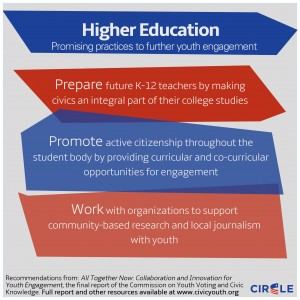Crucial Role for Higher Ed in Building Youth Civic Engagement
There are deep inequalities in youth civic knowledge and participation across socioeconomic levels that must be addressed to strengthen our democracy. Some of these disparities are described in “All Together Now: Collaboration and Innovation for Youth Engagement,” the report from our Commission on Youth Voting and Civic Knowledge. The report goes on to highlight the importance of strengthening K-12 civic education as a way to close the civic achievement gap, particularly for youth who do not have immediate college plans and are less likely to be exposed to civic opportunities.
There is also a vital role for universities and other institutions of higher education, not only in promoting youth engagement, but also closing this gap. Recommendations include:
- Provide civic opportunities for their students
- Enable student voting and registration
- Include civic work as an institutional value
- Prepare future civics and government teachers
- Provide professional development opportunities for current teachers
- Partner on community-based research and journalism (especially with youth)
- Serve as conveners of academic and non-academic resources
- Contribute to research and implementation of innovative youth civic engagement strategies
On the most direct level, colleges can work to promote active citizenship and civic involvement throughout the student body and the rest of their academic community, and provide curricular and co-curricular opportunities for engagement. Institutions also have a special responsibility to support voter registration and help students navigate voting law. Universities can help shape the value given to civic education and engagement by giving strong consideration to work in these areas in their faculty hiring and tenure processes. CIRCLE is part of the Tisch College of Citizenship and Public Service at Tufts University, which does exceptional work in many of these areas.
Colleges also have an influence on students at earlier ages and can work with other institutions to help reduce the civic opportunity and achievement gap. Centers of higher education that prepare teachers can make civics an integral part of their curricula. Our policy scan for the Commission report revealed that only 10 states require instructors who teach civics or government classes to have certification in that specific field, and our survey found that most teachers had very limited professional development opportunities in that area.
More broadly, however, institutions of higher education can contribute to improving civic education and engagement for youth both within and beyond their local host communities. Colleges are natural partners for both national and local organizations that do grassroots work on a whole host of issues. Universities can work with organizations to support community-driven research and local journalism with youth; the latter is particularly valuable, not just as an outlet for engagement, but also in developing skills vital to work and civic life.
As important centers of research, institutions of higher learning can also adopt community-based participatory research (CBPR) practices; serve as conveners of academic and non-academic resources; and support scientific investigations and inquiry in concert with community members, especially young people (examples here). Universities are also uniquely poised to contribute to both the research and implementation of innovative youth civic engagement strategies. This is particularly crucial given the exciting opportunities for civic innovation presented by new technologies, which are still emerging and require further study and experimentation.
Colleges and universities should embrace this civic mission, for the benefit of their students, communities, and democracy.







January 17th, 2014 at 11:40 am
[…] CIRCLE (the Center for Information and Research on Civic Learning and Engagement) published this article on the Crucial Role for Higher Education in Building Youth Civic Engagement. […]